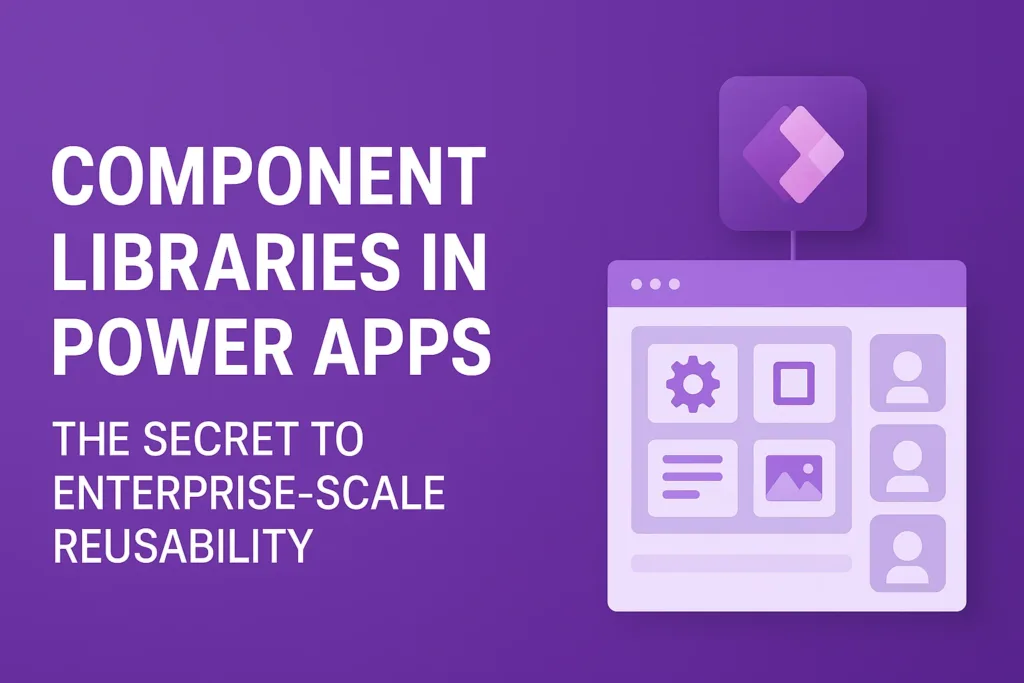As businesses grow, their teams and processes naturally become more complex. A Power App that works perfectly for a 5-person team may not handle the demands of a 500-person organization. That’s why designing scalable Power Apps is critical if you want your digital tools to evolve with your business.
At Skysoft Connections, we specialize in building scalable Microsoft Power Platform solutions—ensuring your apps not only meet today’s needs but also adapt seamlessly to tomorrow’s growth.
Why Scalability Matters in Power Apps
When teams expand, apps often face challenges like:
- Slower performance due to heavy data loads
- Confusing user navigation as features multiply
- Manual workflows that break under pressure
- Integration issues with external systems
A scalable design avoids these problems by focusing on performance, flexibility, and adaptability from day one.
Key Principles of Designing Scalable Power Apps

1. Build with a Modular Approach
Instead of creating one large, complex app, break it down into smaller modules. For example:
| Scenario | Scalable Approach | Non-Scalable Approach |
|---|---|---|
| Expense Tracking | Separate modules for approval, reporting, and receipts | One giant app with everything mixed together |
| Onboarding | Individual apps for HR, IT setup, and training | A single bulky app trying to cover all processes |
This makes it easier to add or remove functionality as the business grows.
2. Use Dataverse for Data Management
As teams expand, SharePoint lists or Excel may no longer be efficient. Microsoft Dataverse offers enterprise-grade data storage, role-based security, and seamless integration with Dynamics 365 and Power BI.
👉 Example: A retail chain with 300+ stores shifted from Excel-based stock tracking to a Dataverse-backed Power App. The result? Real-time visibility across all stores with no performance drop.
3. Optimize Performance Early
Slow apps kill productivity. To keep Power Apps fast:
- Minimize the use of nested formulas
- Cache data for frequently used lists
- Use collections for temporary storage
- Optimize delegation for large datasets
By focusing on performance upfront, you avoid costly rebuilds later.
4. Prioritize User Experience (UX)
As teams grow, the diversity of users increases. A clear and intuitive design ensures adoption.
- Use role-based views so users see only what’s relevant
- Keep navigation consistent across modules
- Add search and filter features for large data sets
A good UX makes scaling painless because new users adapt quickly.
5. Automate with Power Automate
Manual approvals may work for small teams, but at scale they create bottlenecks. By integrating Power Automate, you can streamline repetitive tasks:
- Automatic notifications for approvals
- Scheduled data refreshes
- Real-time updates across apps
This not only saves time but also reduces errors.
Real-World Example of Scalable Power App
A manufacturing company started with a small Power App to manage equipment inspections for one facility. As they expanded to 12 facilities globally, the app grew into a scalable solution by:
- Moving data to Dataverse for global access
- Automating workflows with Power Automate
- Connecting insights to Power BI dashboards
- Adopting modular app design for each plant
Result: A single platform managing thousands of inspections daily, without compromising speed or usability.
Best Practices Checklist for Scalable Power Apps
✅ Choose Dataverse over Excel/SharePoint for long-term growth
✅ Design modular apps, not monolithic ones
✅ Optimize delegation and caching to improve speed
✅ Use role-based security for access control
✅ Automate repetitive tasks with Power Automate
✅ Monitor and improve with Power BI insights

How Skysoft Connections Can Help
At Skysoft Connections, we’ve delivered 40,000+ hours of Microsoft Power Platform solutions with a 100% success rate. Our team specializes in:
- Custom Power Apps Development – Scalable and secure applications
- Integration Services – Connecting Power Apps with Dynamics 365, Azure, and third-party systems
- Data Visualization with Power BI – Turn raw data into actionable insights
- Ongoing Support & Optimization – Keeping your apps efficient as your team grows
Whether you’re scaling from 10 users to 1,000 or moving from Excel to Dataverse, we’ll ensure your apps keep up with your growth.
Conclusion
Designing scalable Power Apps isn’t just about building for today—it’s about future-proofing your business. By focusing on modular design, performance, data management, and automation, you’ll create solutions that grow with your team.
And with Skysoft Connections as your partner, you’ll have the expertise needed to make your apps truly scalable, adaptable, and impactful.
Read more : component libraries in power apps
FAQ’s
Scalability comes from using modular design, enterprise data management (Dataverse), and automated workflows to handle growth without performance issues.
Yes! Even small businesses should design with scalability in mind to avoid expensive redesigns later.
We combine best practices in app design, data management, and automation to build Power Apps that evolve seamlessly as your business expands.
 is a software solution company that was established in 2016. Our quality services begin with experience and end with dedication. Our directors have more than 15 years of IT experience to handle various projects successfully. Our dedicated teams are available to help our clients streamline their business processes, enhance their customer support, automate their day-to-day tasks, and provide software solutions tailored to their specific needs. We are experts in Dynamics 365 and Power Platform services, whether you need Dynamics 365 implementation, customization, integration, data migration, training, or ongoing support.
is a software solution company that was established in 2016. Our quality services begin with experience and end with dedication. Our directors have more than 15 years of IT experience to handle various projects successfully. Our dedicated teams are available to help our clients streamline their business processes, enhance their customer support, automate their day-to-day tasks, and provide software solutions tailored to their specific needs. We are experts in Dynamics 365 and Power Platform services, whether you need Dynamics 365 implementation, customization, integration, data migration, training, or ongoing support.


